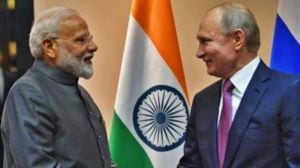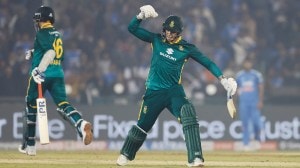Pak bombshell: Indian brigadier sold us 1965 war plan for Rs 20,000
Former Pakistan president Ayub Khan bought an Indian secret plan detailing its operations in Pakistan in 1965 from an Indian army Brigadier ...

Former Pakistan president Ayub Khan bought an Indian secret plan detailing its operations in Pakistan in 1965 from an Indian army Brigadier for only Rs 20,000.
Disclosing this in an exclusive interview to The News, Gohar Ayub Khan, the former president’s son, said the Indian brigadier needed the money for his wife who wanted to buy equipment to fulfil her hobby of canning fruits and vegetables. He said Pakistani agents, active in New Delhi, exploited this passion of the brigadier’s wife and bought the plan.
Gohar Ayub, now 68 years old, is writing his autobiography that will hit the market in December this year. He was witness to imposition of Pakistan’s first martial law by his father who ruled for 10 years. Gohar was Speaker of Pakistan’s National Assembly and Foreign Minister.
Asked to name the brigadier, Gohar said he would give clear indications in his book to expose the identity of the Indian military officer, who is still alive.
This would be a ‘‘bombshell’’ for the Indian army as the same officer later served at a very top position before retiring ‘‘honourably’’. He said he met the Indian officer in London in 1967.
Gohar said Ayub Khan was preparing the Pakistan army to fight a war with India to ‘‘liberate’’ Kashmir. For this very purpose, he followed a long term policy.
He said the first thing Ayub did was to join the Baghdad Pact as it enabled Pakistan to get American military aid in the form of ammunition, guns, tanks, submarines, fighter planes, naval ships that otherwise Pakistan could not afford.
The equipment given to Pakistan by the Americans was more advanced in technology than that available with the Indian army, he said.
He claimed that the Pakistani army was secretly saving the ammunition to dodge the Americans who were keeping a record of all military equipment being given to Pakistan.
Secondly, he said, Ayub Khan directed his intelligence network, active in New Delhi, to penetrate the Indian Directorate of Military Operations to get their war plan.
Gohar said a brigadier was traced who agreed to sell the war plan against a payment of Rs 20,000. After initial secret negotiations, it was agreed between the Pakistani agents and the Indian army officer that the payment would be made in London and he would deliver the war plan in New Delhi after getting confirmation of the receipt of money.
Gohar claimed that Brigadier Said Ghaus, Pakistan’s military attache in London, made the payment. When GHQ in Pakistan received the secret plan of the Indian army, everybody, including Ayub Khan, was surprised by the comprehensive details mentioned in the plan.
Pakistani generals even doubted its credibility, assuming that the Indian officer may have planted these secrets with the collaboration of the Indian high command. The plan was re-checked from other intelligence sources in New Delhi and it turned out to be the actual plan.
Gohar said Ayub Khan issued instructions to his own military command that in future the Pakistan army should not keep its own plans with such great details, as the Indians had done, lest it fall into enemy hands.
Ayub Khan deployed Pakistani forces on those fronts where the Indians planned to attack and also sent some forces to those areas that the Indian army did not plan to attack.
According to Gohar, it was decided that reinforcements would be ensured on those fronts where the Indian army was expected to launch attacks.
The Lahore military commander, however, failed to implement the plan as he moved his forces late, much to the disappointment and annoyance of the top military brass, Gohar said.
He said initially, the Pakistan army defended its positions when the Indians launched attacks. After stabilising those fronts, the Pakistan army launched its attack at Chhamb Jaurian (he is perhaps referring to Khemkaran) that was left unguarded by Indians as indicated in their secret war plan. No Indian soldier was found defending the border and the Pakistan army started its advance secretly.
Gohar said the Pakistani forces were supposed to cross the Beas river bridge to besiege the Indian army in east Punjab and three other divisions that had no idea that the Pakistan army was advancing. When the Pakistani forces launched the attack, Indian fighter jets monitored their movements. The Pakistani strike force had been hiding in that area since January 1965, without being noticed by the Indian army.
Indian army chief General Chaudhry panicked and, in a meeting, told his high command that India should withdraw its forces from Beas as the Pakistan army was advancing and might slaughter his soldiers.
However, bad luck struck the Pakistani troops when they were crossing the Beas bridge. One of their tanks hit the bank of the bridge that collapsed and blocked the advance into Indian areas.
(According to authentic military records, no Pak troops reached the Beas Bridge because they were stopped short by Lt Gen Harbaksh Singh. He was able to stop Pak troops along a ditch in Khemkaran where the cream of the Pak armoured regiment was destroyed, including two senior commanders. here, a large body of tanks were caught under a moonlit sky in what later earned the place the sobriquet of Patton Nagar, the graveyard of Pak tanks.)
According to Gohar, this development put Ayub Khan and other military commanders in a fix as everybody was counting on this attack and all of a sudden, the operation had come to a halt.
Major General Sher Bahadur was sent from GHQ, Rawalpindi, by a helicopter to ensure immediate repair of the bridge. But the bridge could not be repaired even in three days and it enabled the Indians to breach their canals, flood the entire area to stop the Pakistan army advance.
Gohar said Pakistan lost one of the biggest chances of conquering Indian territories because of a small fault of a tank driver and it greatly disappointed Ayub Khan because he had the Indian war plan but Pakistan failed to utilise it.
But the payment of Rs 20,000, Gohar said, at least enabled Pakistani forces to defend the massive Indian attack. — (The News)
- 01
- 02
- 03
- 04
- 05































